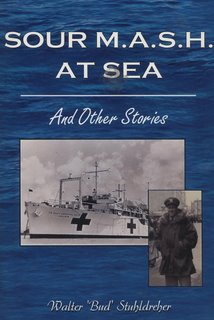SOUR M.A.S.H AT SEA

A book with the unusual title SOUR M.A.S.H. AT SEA is the latest addition to my library of military related tomes. It was written by a Supply Corps Officer by the name of Walter "Bud" Stuhldreher. He served aboard the hospital ship USS Haven during the closing days of the Korean War. He was assigned duty as the ship's Disbursing Officer (viz. paymaster).
One chapter in his book relates to an unusual MPC conversion day (C-Day) which took place in 1954. Ensign "Bud" had been briefed into the details of the procedures for use of MPC. But, what he had not known was that hospital ships were not allowed to moor at piers in war zones, and that they were also not allowed to communicate classified information. These rules, from the Geneva Conventions, would inpact on the events of this Navy C-Day in 1954.
During May of 1954, the USS Haven was anchored at harbor, in Inchon, Korea. One morning a fellow officer rushed in to Bud's stateroom to relate an announcement he had just heard on Armed Forces Radio that all MPC had to be exchanged today for a new series , or would become worthless! According to Bud's account he went to his C.O. and said "Captain, as I see it, you don't really have a choice. You simply are going to have to let me take the crew's money away from them. By tonight, there can't be a single cent in anyone's pockets, not even the wounded men in the hospital !" Of course, because of his isolation, and communications rules, Bud had not known of the C-Day, and did not have a supply of the new series of MPC to exchange.
"By radio, we soon learned that the Army at Ascom City would issue us the new script [sic]. Also, after a vicious argument, they agreed to remain open until we could get there to pick up the new series." But first, there was the necessity of a "reverse payday", where money would have to be taken from the 500 man crew and like number of patients, which included soldiers from "a half dozen countries". Of particular concern to Bud were "the twenty-or-so Turkish soldiers" who were know by the crew to be "uncooperative, at best". At 1330, the announcement of a reverse payday was announced. All went well, except for the Turks. "They howled with anger"- but finally all the MPC was collected. "There were no poker games that night."
Then, Bud departed, by boat, then truck, with six armed guards from Inchon to Ascom to buy $200,000.00 of the new money. They didn't return until late that night. "The next day, at 1000 a normal payday was held and the new MPCs were exchanged for the pay chits. - - - The Turks could not believe their good luck." Bud never mentioned which series of MPC were involved. But , based on the dates, it was an exchange from series 481 to 521. The report of Turkish , and other foreign soldiers, using MPC aboard a US Navy ship is also news to me. Bud ends the chapter with this claim: "This was the only payday in the history of the US Navy, where money was taken away from sailors!"
